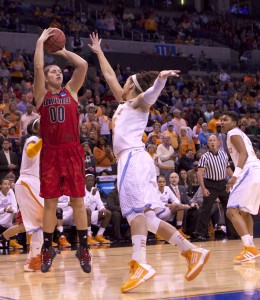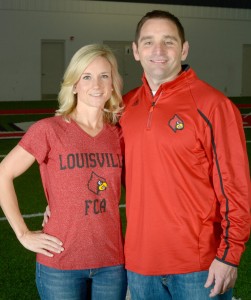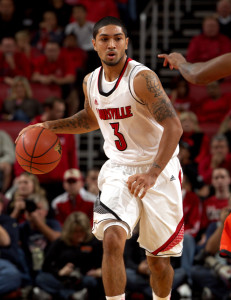Chris Morgan thumbed through the Old Testament. He flipped past chunks of pages until he came to 1 Samuel, turning to chapter 17 and reading one of Scripture’s most well-known stories (v. 1-4):
“Now the Philistines gathered their forces for war and assembled at Sokoh in Judah. … The Philistines occupied one hill and the Israelites another, with the valley between them. A champion named Goliath, who was from Gath, came out of the Philistine camp. His height was six cubits and a span …(NIV)”
On a cold day in late March 2013, Morgan, the University of Louisville’s FCA sports chaplain, retold the familiar narrative of David and Goliath to the school’s women’s basketball team. It was an apt passage. The Cardinals were about to fly to Oklahoma City to face mighty Baylor in the Sweet 16. The defending national champion Bears boasted a No. 1 ranking, a 34-1 record (including a 32-game winning streak), and possibly the greatest player in women’s college basketball history.
Goliath, as described in Scripture, was about 9 feet, 9 inches tall. Brittney Griner, Baylor’s All-America senior, wasn’t far behind. Standing 6-foot-8 with a 9-foot-2 vertical reach, Griner was a ferocious inside presence who hadn’t been stopped yet that season. Few, if any, thought the Cardinals would be the first to do so.

"It's pretty awesome to see the lives that are touched each week and the walls that are broken down."
-Sara Hammond
“Then he took his staff in his hand, chose five smooth stones from the stream, put them in the pouch of his shepherd’s bag and, with his sling in his hand, approached the Philistine. (v. 40, NIV)”
Morgan spoke about what great faith in God can accomplish. He gave the team five smooth stones, each inscribed with a word: passion, pride, priority, perseverance and promise. To win the program’s first national championship, the Cardinals needed four more victories. “Let’s see how many rocks you have left in your bag when you return,” Morgan told them.
The stones were only meant as a metaphor. But when the players boarded their plane, their luggage was a few ounces heavier.
“We took those stones on our trip,” junior forward Sara Hammond recalls. “We rubbed on them and took the story to heart.”
What followed was one of the greatest upsets in women’s college basketball history. Louisville limited Griner to 14 points on 4-of-10 shooting and pulled off an 82-81 victory.
The giant had fallen.
“So David triumphed over the Philistine with a sling and a stone... (v. 50, NIV)”
Two wins later, the plucky Cardinals became the first-ever No. 5 seed to reach the national championship game (where they lost to juggernaut Connecticut). Yet the team's inspiring run was just one of many features on Louisville's overall 2012-13 athletic highlight reel, which included a BCS bowl victory by the football team, the school's first men's basketball NCAA championship since 1986, and the baseball team's second-ever College World Series appearance. No other univer-sity has achieved that level of success in those four sports in a single school year.
Overall, 11 Louisville teams entered the national top-25 rankings in their respective sports, and student-athletes across the entire athletic department posted a school-record 3.124 cumulative GPA. The school also announced that it would compete in the vaunted Atlantic Coast Conference starting in fall 2014.
It truly was The Year of the Cardinal.
As Louisville’s athletic success is booming, so is its on-campus FCA Huddle. Morgan and his wife, Tammy, are leading a thriving ministry that is attracting hundreds of student-athletes and coaches, ministering to each of the school’s 23 varsity sports and changing lives.

Tammy and Chris Morgan
“I’ve never seen it at this magnitude,” says Stephanie Norman, a women’s basketball associate head coach and 23-year coaching veteran. “This is by far the most—in terms of sheer numbers and lives impacted—I’ve seen among the five places I’ve worked. It’s the biggest and the best I’ve seen. But it doesn’t surprise me. When you believe in God and His power, nothing surprises you.”
Morgan senses something special, too.
“The favor of God is on this campus.”
• • •
Morgan’s workplace is the epicenter of a unique region.
Louisville—the city of a hundred pronunciations, but spoken as "Loo-uh-vull" by most natives—rests on the southern banks of the Ohio River, just across the Indiana border, in an area colloquially referred to as “Kentuckiana.” Louisville, and Kentucky itself, is surrounded by seven other states. Is it the South? The Midwest?
“It’s kind of a confused area,” Morgan admits.
Louisville is nothing if not eclectic. It’s a hodgepodge of big-city lights, southern gentility and midwestern simplicity where all manner of arts, business, leisure and religion blend together in an anthropological stew. In Louisville, you can attend the Kentucky Derby, hike the nation’s largest urban forest, join a thriving hipster scene, or enroll at Southern Baptist Theological Seminary.
It’s the birthplace of Muhammad Ali, the high school home of Tom Cruise, an early stopover for a young Thomas Edison, the career launching pad for Diane Sawyer, the collegiate stomping grounds of Johnny Unitas, and the burial site of Col. Sanders. How’s that for eclectic?
Louisville is also one of America’s largest cities without a major professional sports team. But you’d never know it by the Cardinal-red fanaticism in town, especially for the annual basketball grudge match with Kentucky.
“At Louisville,” Cardinals baseball coach Dan McDonnell says, “you are the professional team.”
This is the backdrop for Morgan’s work—a primetime hotbed for Christian sports ministry on a campus of 22,000 students. Still, Louisville’s now-flourishing FCA Huddle took time to develop into what it is today.
Arthur Albiero, Louisville’s longtime swimming and diving coach, recalls attending an FCA gathering in the Student Activities Center shortly after getting hired in 2003. The leader at the time was Brian Kiser, a three-point sharpshooter for Hall of Fame coach Denny Crum’s Cardinals of the mid-1990s. With his 6-foot-6 frame and fiery personality, Kiser cut an imposing figure as he shared God’s Word and challenged attendees to go deeper spiritually.
But when Kiser and his family were called to a different mission field, the opportunity opened for someone to build on the foundation that had been laid.
Enter Chris Morgan.
Bringing It Home Devotional: Does Spiritual Fervor = Athletic Success?
Like two locomotives running full-steam along parallel tracks, the University of Louisville athletic department and the campus’s FCA Huddle are thriving simultaneously. The concurrence has raised an interesting question: Are the phenomena somehow linked? Is there a tangible correlation between the spiritual growth and athletic success occurring at Louisville—or anywhere else for that matter?
Read more
A former football captain at NAIA Campbellsville (Ky.) University, Morgan became an FCA Louisville area representative in 1999 and eventually received permission from Cardinals football coach Bobby Petrino, who was hired by Louisville in January after coaching at the school from 2003 to 2006, to host Friday night football chapels in 2004. But it wasn’t until three years later—after former Tulsa coach Steve Kragthorpe replaced Petrino—that Morgan’s vision for the campus truly came to fruition.
Kragthorpe, a big FCA supporter who is now an administrator on the LSU football coaching staff, wanted a greater minis-try presence on campus: more weekly meetings, more coaches’ Bible studies, the works. He, along with six other head coaches, helped Morgan become a full-time chaplain on campus.
Morgan worked tirelessly to reach out to all campus teams. And with the support of Charlie Strong, Louisville’s football coach from 2010-13, who took over at Texas in January, “it really started not just to add, but multiply,” Morgan says.
The first Monday night Huddle in 2007—held in a small meeting room for defensive backs in the football facility—drew four football players and three female soccer players. Now, nearly seven years later, approximately 300 attendees stream into the football stadium’s expansive PNC Club luxury suite each week after the meeting outgrew the football team’s film room last October.
The Monday night excitement is palpable.
“Each week, new people are raising their hands when Chris asks if it’s their first time attending,” says Hammond, one of Morgan’s 25 key student-athlete small group leaders. “It’s pretty awesome to see the lives that are touched each week and the walls that are broken down. People have a hole in their hearts. Chris will come up to some leaders and say, ‘I just talked to a kid 25 minutes ago, and he gave his life to Christ.’ What better news is there to hear than that?”

"We're not just athletes, but sons and daughters of God."
-Kelsi Worrell
In the last four years, Morgan has baptized roughly 100 athletes, including 28 in the school’s natatorium in late November. The aquatic facility that night was an enthusiastically raucous scene, packed with several hundred cheering onlookers.
"FCA is changing people’s lives,” Albiero says. “It’s giving a support system to our athletes behind the scenes that’s very strong. Student-athletes here are a really tight group, and I think FCA is a large part of that.”
Besides Monday night meetings, Morgan is a constant presence at the practices of each sport. He leads a Bible study for head coaches on Tuesday mornings and for assistant coaches on Wednesdays. During the fall, he hosts a football staff Bible study on Friday mornings and travels with the team to all road games. In the winter, he leads devotionals for the swimming and diving team before every home meet, men’s basketball team Bible studies on Thursday nights, and women’s basketball chapels on game days.
One way or another, he is involved with all 23 sports. And he does it all with a staff that only includes his wife, a part-timer and three interns. Coaches and athletes marvel at the way Morgan seemingly packs 25 hours into each day while attending to so many different needs.
“I don’t know how he keeps his schedule,” Albiero says. “If I call him right now at 9:30 [p.m.], I know he’ll answer. This guy isn’t asking for anything. He’s just here.”
• • •
Amidst the booming success and big numbers, Morgan works hard to maintain a personal touch with individuals.
“He’s an incredible example,” sophomore swimmer Kelsi Worrell says. “So many people come from broken homes, and he’s available to everyone.”
Including athletes such as Peyton Siva.
In 2009, Siva, a McDonald’s High School All-American from Seattle, arrived at Louisville with great expectations and enough personal baggage to fill a U-Haul truck. His parents divorced before his first birthday, and his dad fell into drug abuse and spent time in prison. Siva’s older brother and sister did jail time, too. Once, when he was 13, Siva borrowed his brother’s car to search the streets of Seattle for his dad, only to find him on a street corner with a gun in his hand and fatal intentions in his heart. Siva talked him out of it.
In high school, Siva benefited from the spiritual counsel of a local youth pastor. But once he reached college—2,300 miles from home—Siva needed something more, something closer. At the invitation of teammate Jared Swopshire, Siva started attending Morgan’s Thursday night team Bible studies.
“It’s funny because he brought Chick-fil-A [sandwiches], and that brought a lot of people to Bible study,” recalls Siva, the starting point guard of last year’s NCAA championship team who now plays for the NBA’s Detroit Pistons. “Once they came, they really respected him. You could just tell there was something about him.”
Eager to be challenged spiritually, Siva quickly formed a bond with Morgan. They talked after games and chatted over lunch. Morgan often texted Scripture passages to Siva and exhorted him to use his Division I fame for God’s glory.
By the end of his illustrious college career, Siva had transformed from a young, relatively immature believer into the un-disputed spiritual leader of the basketball team.
“His footprints are still throughout this [year’s] team because he reproduced himself spiritually,” Morgan says.
Siva credits FCA with helping him “stay grounded and humble, no matter how much success or downfalls happened. I always knew I was playing for a bigger purpose than me. FCA helped with that—playing to give God the glory.”

"I always knew I was playing for a bigger purpose than me. FCA helped with that—playing to give God the glory."
-Peyton Siva
As for Morgan, Siva says, “His phone is always on. He tells us to call him whenever. He was there for us. He’s just a great guy.”
That’s a common refrain among Louisville’s athletes. Morgan, a 40-year-old with a football player’s build, an ever-present smile and three young daughters, is more than just a preacher behind a podium. He’s a relational magnet who seeks to model the gospel with selfless actions as much as prepared words. He and Tammy, who leads a Bible study for coaches’ wives each week and ministers to many of the school’s female athletes, have devoted their lives to spreading the love of Christ on campus.
“They’re a great, godly couple who pour out compassion to those who need it,” Hammond says.
Other cases in point: When former Louisville running back Victor Anderson, who grew up with a drug-addicted mother and a drug-dealing father, needed someone to talk to, Morgan was there. When former golfer Danielle Kom’s mom started undergoing chemotherapy treatments for colon cancer, Morgan came to each of the sessions. When current junior defensive tackle Jamaine Brooks’ mom suffered a stroke, Morgan called her hospital room and prayed for her, bringing a smile to a woman who hadn’t yet regained her speech. When senior basketball guard Tim Henderson was thirsting for something more than the college party scene, Morgan’s encouragement provided cool water to a spiritually parched soul.
The list goes on and on.
“He’s one of the greatest people I’ve ever met,” Henderson says. “He’s so selfless with his time. For his tight schedule, he’s always trying to meet with you and talk to you about Christ. He told me how he grew up and struggled with the same things I did and how he eventually said, ‘It’s all or nothing.’”
Morgan downplays his role, saying his job “is really not work to me.”
“We just throw the seed, and God allows it to grow,” he says. “It’s nothing magical we do—just honoring the Word of God and allowing Him to do the rest.”
• • •
Could this be another Year of the Cardinal?
Last fall, the men’s and women’s soccer teams reached the NCAA tournament. The football team completed an 11-2 season in December with a big win over Miami in the Russell Athletic Bowl. Both basketball teams are currently positioned to dance deep into March. And the baseball team is hoping to punch another ticket to Omaha in a few months.
However the rest of the athletic year plays out, Morgan and his FCA staff will continue to minister behind the scenes and offer the gospel’s life-changing truth to an athletic department on the rise. Another Year of the Cardinal would be historic. But those involved in Louisville FCA know that true glory isn’t measured in human terms.
“We’re definitely focused on giving glory to God,” Worrell says. “We’re not just athletes, but sons and daughters of God. We’ve been focusing on our identity [in Huddles recently]. I’ve learned so much about that in the past year—how awesome our platform is to bring glory to God. If we have a bad game or meet or performance, it doesn’t matter as long as we bring glory to God. Our sport isn’t what defines us.”
Originally Published: March 2014
Photos courtesy of U of L Sports Information, Chris Morgan and Scott Henson
Does Spiritual Fervor = Athletic Success?
Like two locomotives running full-steam along parallel tracks, the University of Louisville athletic department and the cam-pus’s FCA Huddle are thriving simultaneously.
The concurrence has raised an interesting question: Are the phenomena somehow linked? Is there a tangible correlation between the spiritual growth and athletic success occurring at Louisville—or anywhere else for that matter?
Many Cardinal coaches, as well as FCA staffer and Louisville sports chaplain Chris Morgan believe there’s some connection, even if it’s not easily explained.
The possibility “gives me goose bumps,” says Arthur Albiero, Louisville’s swimming and diving coach. “It’s hard to argue that’s not the case. The blessings here are nothing short of spectacular.”
These are deep theological waters. On the one hand, when Morgan says, “The favor of God is on this campus,” he’s absolutely correct. For sinners saved by grace, all success—whether reflected in a win-loss column or elsewhere—is ultimately gift-wrapped by loving, divine fingers (James 1:17).
But trying to establish concrete links between spiritual and athletic success is to wade into supernatural currents and ed-dies that direct human history yet often evade human understanding. Who’s to say, for instance, why other universities with a strong Christian presence on campus aren’t winning like Louisville? Why does one football team with 10 strong Christians reach a bowl game and another with 15 go 4-8? To judge a team’s—or an entire university’s—spiritual climate by athletic achievement is a dangerous business.
Here’s what we do know: Godly character, humility and proper reverence clearly affect life’s outcomes (Psalm 84:11, Isaiah 66:2, 1 Peter 5:5). And God works out everything—even college athletics—according to His will (Ephesians 1:11). At some level, symbiosis exists between human action and God’s sovereign, universal plan. But the exact nature and intricacies of the relationship often remain a mystery.
And that’s OK. As finite humans, we are not meant to fully understand God’s omniscient plans. As Job 11:7 (NIV) rhetorically asks, “Can you fathom the mysteries of God? Can you probe the limits of the Almighty?”
Our purpose on earth is to strive for God’s glory (1 Corinthians 10:31), regardless of the arena of life we find ourselves in. And when blessings come, we must give praise to our Heavenly Father, who loves bestowing good gifts on his children (Matthew 7:11)—even when full understanding of the gifts eludes us.